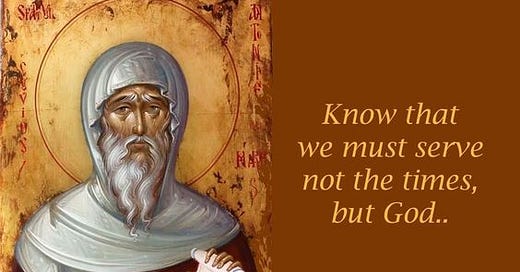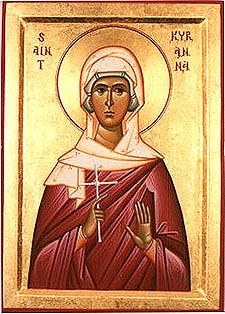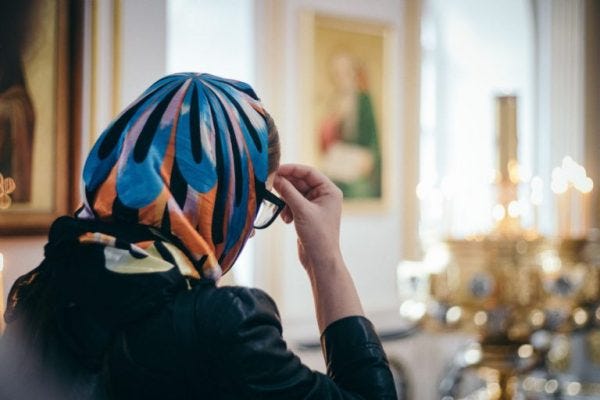Daily Scripture Readings
Philippians 1:27-2:4 (Epistle)
27 Only let your conduct be worthy of the gospel of Christ, so that whether I come and see you or am absent, I may hear of your affairs, that you stand fast in one spirit, with one mind striving together for the faith of the gospel,
28 and not in any way terrified by your adversaries, which is to them a proof of perdition, but to you of salvation, and that from God.
29 For to you it has been granted on behalf of Christ, not only to believe in Him, but also to suffer for His sake,
30 having the same conflict which you saw in me and now hear is in me.
1 Therefore if there is any consolation in Christ, if any comfort of love, if any fellowship of the Spirit, if any affection and mercy,
2 fulfill my joy by being like-minded, having the same love, being of one accord, of one mind.
3 Let nothing be done through selfish ambition or conceit, but in lowliness of mind let each esteem others better than himself.
4 Let each of you look out not only for his own interests, but also for the interests of others.
Luke 12:2-12 (Gospel)
2 For there is nothing covered that will not be revealed, nor hidden that will not be known.
3 Therefore whatever you have spoken in the dark will be heard in the light, and what you have spoken in the ear in inner rooms will be proclaimed on the housetops.
4 And I say to you, My friends, do not be afraid of those who kill the body, and after that have no more that they can do.
5 But I will show you whom you should fear: Fear Him who, after He has killed, has power to cast into hell; yes, I say to you, fear Him!
6 Are not five sparrows sold for two copper coins? And not one of them is forgotten before God.
7 But the very hairs of your head are all numbered. Do not fear therefore; you are of more value than many sparrows.
8 Also I say to you, whoever confesses Me before men, him the Son of Man also will confess before the angels of God.
9 But he who denies Me before men will be denied before the angels of God.
10 And anyone who speaks a word against the Son of Man, it will be forgiven him; but to him who blasphemes against the Holy Spirit, it will not be forgiven.
11 Now when they bring you to the synagogues and magistrates and authorities, do not worry about how or what you should answer, or what you should say.
12 For the Holy Spirit will teach you in that very hour what you ought to say.”
Martyrs Kyriaina and Juliana in Cilicia (4th c.)
The Holy Martyr Kyriaina (Κυριαίνα) was from Tarsus in Cilicia, and Saint Juliana was from the city of Roso. These virtuous women devoted themselves to works of charity and Christian philanthropy during the reign of Emperor Maximian Galerius (305-311). They cared for orphans, comforted poor widows and treated the sick without charging any fee. They knew how to read and write somewhat, but they were very eager and always found a way to support the faith of those who suffered from poverty, injustice, or other trials.
Many times they succeeded in bringing pagans to the light of Christ through the Gospel, and by their own patience and goodness.
The Saints were arrested by Marcian, the governor of Cilicia, who tried to make them to deny Christ, but they refused to do this. Therefore, Marcian had Kyriaina's hair and eyebrows shaved, and forced her to walk naked through the streets of Tarsus. Then she and Juliana were taken to the city of Roso, where they were burnt alive. They endured this horrible death with admirable steadfastness and self-denial, thereby obtaining the incorruptible crown of martyrdom from Christ.
Faith, Culture, and Politics
FR. THEODORE STYLIANOPOULOS
As Scripture teaches, the world is a gift of God: “The earth is the Lord’s and all that is in it, the world, and those who live in it” (Psalm 24:1). The eternal Christ was God’s agent of creation. “All things were made through Him, and without Him not anything made that was made” (John 1:3). The Lord Himself took on human nature for our salvation. He “became flesh and dwelt among us, full of grace and truth” (John 1:14). On these premises, we receive and use all things in the world with gratitude and thanksgiving to God as the source of all blessings.
But Scripture gives another meaning to the “world” as well, a metaphorical meaning that defines the world as the realm of human affairs. This meaning of “world” signifies society that often stirs and acts in ways contrary to God’s will and indeed sometimes in defiant opposition to God’s purposes. This world is inclined toward evil and is often driven by the power of evil. Think of wars, crimes, exploitation, flagrant injustices, immorality, cruelty, and countless other forms of “man’s inhumanity to man.” This is the “world” that Christ primarily came to illuminate and to save. “God so loved the world that He gave his only Son, that whoever believes in Him should not perish but have eternal life” (John 3:16).
A Christian is challenged to live in these two overlapping worlds, the world as God’s gift and the world as the fallen and unredeemed sphere of human affairs, and to do so with knowledge and discretion. For Orthodox Christians the chief source of truth is the life of Christ and the teachings of the New Testament as interpreted within the faith and spirit of the Orthodox tradition. Discretion comes from the careful practice of prayer, sacramental life, ethical Christian living, and spiritual growth.
When Jesus declared to Pilate “My kingdom (or kingship) is not of (or from) this world” (John 18:36), He did not mean to separate His kingdom from the world but only to disclose that His authority, rule and power derived from God and not the world of human affairs. But the very purpose of Christ’s coming into the world was precisely to have His kingdom (rule and ways) change and transform the world–never of course by force but only by faith and free conversion of the heart. The main vocation of Christians is therefore not to separate from the world, adopting sectarian forms of life, but to dwell in it as Christ’s witnesses and to work by word and example for the betterment and the salvation of the world. Even those who adopt monasticism as a way of life ought to love the world, be connected with it spiritually, and pray for its redemption. Not only prayer, preaching, and philanthropy, but all forms of culture such as literature, philosophy, science, law, music, sports, and business, properly interpreted and rightly utilized, can be effective means of Christian mission and ministry.
There is a lot of goodness in the world. But the world can also be a cruel and sinister place. Keen discretion and sober moral sensibility are necessary. “Be wise as serpents and innocent as doves,” Jesus advised His followers (Matthew 10:16). In other words, Christians are to rival and even exceed the world in cleverness but at the same time to be innocent or pure and free from evil against anyone or anything–desiring, praying for, and working for the well-being and salvation of all people. Our prototype and model is Christ Himself who became human in order to show us what true humanity is like. While no single human being can reach the spiritual and moral sublimity of the qualities and maturity of Jesus, nevertheless the Christian goal both individually and collectively is to grow toward “the mature manhood to the measure of the stature of the fullness of Christ” (Ephesians 4:13).
The Church Fathers and greatest theologians of the Orthodox Church, such as the Cappadocians (Sts. Basil, Gregory the Theologian, and Gregory of Nyssa), were highly educated in the Hellenic culture, literature and philosophy. They were like bees moving from flower to flower and choosing the “nectar” of these fields which they “baptized” into the Christian worldview and used it as part of the innate goodness that God has put into this world. Because the ground and basis of their intellectual work was the Christian gospel and Christian thought, they selected the spiritual and ethical insights of Greek philosophy and literature (especially from Platonism and Stoicism), but altogether rejected the religious aspects of Greek culture because these were mostly polytheistic and sometimes flagrantly immoral. So today Christian inquirers and students can study and use insights of contemporary literature and philosophy of whatever orientation and background, but only insofar as these are harmonious and useful by the standards of Orthodox faith and life, and being especially careful about the religious aspects of outside philosophies and forms of meditation.
Orthodoxy theology supports as well the ancient Greek principle of “a healthy mind in a healthy body.” This principle did not receive much attention by the Church Fathers and saints who were focused on spiritual far more than material things. Nevertheless, Orthodox thought advocates the sanctity and health of the body through medical treatment, nutrition, physical work, and proper exercise. From this standpoint, Orthodox Christians can participate in the contemporary culture of sports but only with discretion on the basis of Christian principles and virtues, such as moderation, fairness, courage, teamwork, integrity, and other forms of good sportsmanship. St. Paul’s counsel “to glorify God in your body” (1 Cor 6:20), which was meant in the context of moral conduct, can apply to the viewing and practice of athletics. Let us beware however about the fact that in contemporary culture sports often becomes an obsession and is driven by financial interests and the less than Christian principle of “win at all costs.”
Finally, there is the world of politics where “winning at all costs” is a grave temptation and where the ugliest human passions can and do flare up. An article in the periodical Christianity Today, authored by Amy E. Black, was entitled: “How to be political without losing your soul.” Christian faith calls us to be exemplary citizens and participate in the process of political life on the basis of the same Christian principles to be applied to the seamless whole of life. This means not only the responsibility to see through and beyond the incivility and distortions of campaigning, by lamenting and rejecting such forms of politics, but also the task of thinking hard about the issues at hand and making decisions on the basis of Christian intellectual and moral reason.
Amy Black encourages Christians to appreciate the complexity of such issues as taxation, illegal immigration, foreign affairs, and economic policy which certainly have more than one side. Equally honest persons, whether Republicans or Democrats, can respectfully disagree based on equally legitimate intellectual and moral reasons–in which case only fair compromise is the solution. The author also strongly advises “to play fair in the war of words,” standing firm against mean-spirited, false and misleading political talk. We do not have easy answers in a complex world, but we can try to honor God also through politics by means of honest, mutually respectful, reasoned dialogue, and fair compromise as deemed necessary. We may not always be able to do “all things with love” (1 Cor 16:14), as St. Paul exhorts, but we ought to try for the sake of faith and human dignity.
This week’s calendar reminders:
Monday 10/28: Matins 8:30 a.m.
Tuesday 10/29: no services or events
Wednesday 10/30: no services or events
Thursday 10/231: Matins 8:30 a.m.
Friday 11/1: Matins 8:30 a.m.
Saturday 11/2: Catechumen class 4:30; Great Vespers 6 pm
Sunday 11/28: Divine Liturgy 9: 15 a.m.











